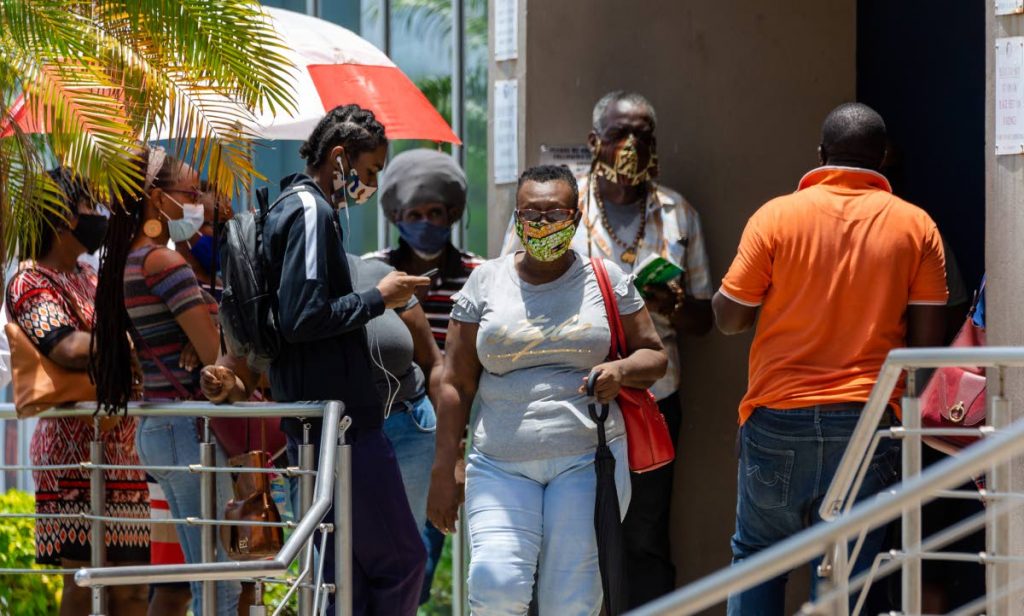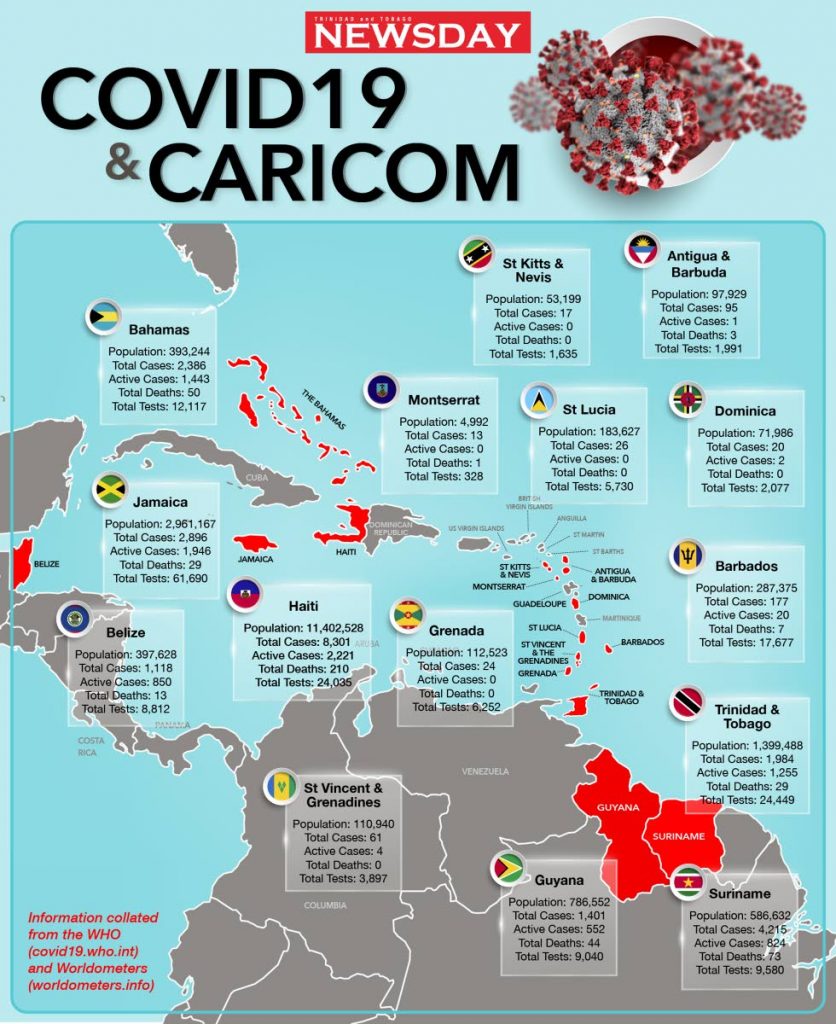Curbing TT covid19 crisis

Community spread is placing the people of TT at an even higher risk of contracting covid19, experts say, amid a surge that has cases crossing the 2,000 mark.
On August 15, Chief Medical Officer Dr Roshan Parasram announced that he recommended to the Pan American Health Organization (PAHO) that the World Health Organization (WHO) list TT as having moved from the stage of "clusters" to "community spread."
The US Centers for Disease Control and Prevention define community spread as meaning that people infected with the virus in an area includie some who do not know how or where they became infected.
Over the past weeks, the virus has spread at an accelerated rate, with daily Health Ministry updates showing increases from 19 on August 11 to 123 on September 2.
It must be noted that Parasram explained that the daily number did not indicate new cases within the previous 24 hours.
At a press conference, he said samples of positive cases tested by the UWI lab were being sent to CARPHA for confirmation, which resulted in batches of positive results being sent to the labs. Therefore, the reporting of cases was also "batched," causing a lag of five to seven days, rather than immediate case-by-case reporting.
Before August 11, the general trend in the number of daily new cases was between zero and a dozen. The numbers were mostly due to repatriated citizens, but there were a few local cases as well.
This was so except for August 8, which had an increase of 50 cases; according to the Health Ministry release that day, that was a result of samples taken during the period July 30-August 8.
A few months ago, TT was being praised by international bodies for its handling of covid19 and its low numbers. The WHO and Worldometer websites showed in May TT had a total of 116 cases, eight deaths and 2,647 tests.
By September 3, the figures were 1,984; 29 and 24,449 respectively. A day later, they rose to 2,040; 31 and 24,692, with additional cases expected over the weekend.
Now the virus is affecting our leaders. On August 21, in a Facebook post, the Prime Minister said he had been made aware that on August 10, the day of the general election, he was exposed to someone who later tested positive for covid19. He was tested and the results were negative, but he was advised to self-quarantine, and remained there for 14 days after exposure, until August 24.

On August 20, in another Facebook post, former United National Congress (UNC) minister of education and former MP for Caroni East Dr Tim Gopeesingh confirmed that he had tested positive for covid19 and was in state medical care. He is now in home quarantine.
Former Chaguanas West MP Jack Warner was hospitalised last week with the virus, and is said to be doing well.
Follow the rules to curb spread
Dr Christopher Oura, professor of veterinary virology at the Faculty of Medical Sciences, UWI, said he was very concerned about the continued increase of covid19 cases in TT over the past few weeks.
Community spread, he said, "means that the virus is spreading, at the moment, out of control, which is worrying. The implications of community spread are, if it’s not controlled, slowed down, it would spread more and more rapidly.”
He said it was important to control the spread, stop the transmission, and flatten the curve, because contracting covid19 could have very serious consequences for the elderly and a small proportion of people with underlying conditions. Some would have to be put in intensive care, some put on ventilators, and some would die.
He added that many people in TT were high-risk because they had underlying conditions such as diabetes and obesity. Therefore, if other people did not start taking covid19 seriously, following the recommended measures, and obeying the lockdown measures, they could infect these people and they could, in turn, overwhelm the health system, including the testing and contact-tracing systems.
“It’s so important for people to understand that they have to play a role in reducing the spread of the virus. And to do that they need to carry out the recommendations of the Ministry of Health to try to stop direct spread from one person to another...Otherwise we will start seeing people dying in our hospitals.”
He reiterated the ministry’s recommendations to wear face masks over the nose and mouth as well as to social distance to help stop the spread of covid19 over short distances through coughing, sneezing, and even talking and laughing. It could also be spread indirectly on surfaces and hands, so the sanitisation of both was also necessary.
It is now mandatory to wear masks, after legislation was passed in Parliament last weekend.
In addition, Oura urged people to stay home when they were sick, because that was the period during which they were most infectious. He also encouraged people to isolate themselves after being tested for covid19, no matter how long it took to get the results.
Beyond our borders

At TT’s stage of community spread, he compared the country to the Bahamas – population 393,831; and Jamaica, whose population is 2,963,218. As of Thursday, Jamaica had a total of 2,896 cases, 1,946 active cases, and 29 deaths. The Bahamas had 2,386 cases, 1,443 active cases, and 50 deaths.
Oura said every country had different challenges but one of the problems with TT, Jamaica, and Barbados was their borders.
“The problem with TT, of course, is our borders aren’t secure from South America, from Venezuela.”
He said in the Bahamas, the borders were not secure from “outsiders,” and Jamaica had opened its borders. Often, he pinted out, returning citizens and others bring viruses into a country and there was no system available to avoid people returning without the virus, so the only thing to be done was quarantine them for 14 days.
PAHO/WHO representative Dr Erica Wheeler agreed the transition from cluster to community spread was a concern.
“But concern should lead to the recognition that we need an ‘all of society’ approach to tackling this virus. Community spread means that everyone is at increased risk of exposure, and each person should ensure that they take the necessary precautions to reduce their risk of infection, in case they are unknowingly exposed.”
In addition to masks, social distancing and frequently sanitising hands and surfaces, she said people with flu-like symptoms who visited health facilities should have a different protocol for seeing a health professional, and they should not mix with other people at the facility.
Also, people who were instructed to remain in quarantine at home need to do so and follow the guidelines.
She said people needed to recognise their role in slowing down transmission and following the simple but effective public health guidelines was critical.
“They are effective and can save your life or the lives of others you love. at worst. and at best. stave off illness. not just now, but any long-term illness as a result.”
WHO was researching the longer-term effects on people who recovered from covid19 to some extent, but continue to have other health problems, she said.
Wheeler added that the role of government was to ensure sufficient tests and materials were available, testing was done in a timely manner, and results were returned as soon as possible.
Young people are not spared
Testing was a very important part of controlling the spread, she said, since it was from testing that contact tracing, quarantine, and treatment protocols could be followed. Also critical was the tracing of primary and secondary contacts as soon as possible.
“This should then be followed by adhering to the protocol of quarantine, and if symptoms occur, then testing and, if necessary, treatment.
"Again, monitoring is critical. A break in the sequence of identification, testing, quarantine, and treatment or isolation (where necessary) allows opportunities for the virus to continue to spread.
“Unless community spread is brought under control, it will be impossible to open schools without having rapid spread among those populations. The fact that younger persons are now being infected in this second wave is a signal of the range of community spread compared to the first wave.
"Young people are not spared. It is also a reflection of where spread is taking place and is circulating where young people are gathering.”
She said it was noticed that public health and social measures were “relaxed” in TT but similar situations were also observed in other Caribbean countries and around the world.
However, she said reported numbers did not only reflect the total numbers of cases, but also testing strategies, trends such as the health-seeking behaviours of populations, and sizes of populations. So it was important to consider not just reported cases, but also trends.
“Community engagement is essential because human behaviour drives the pandemic. WHO has put together a technical advisory group on behaviour insights and sciences for health. This is in recognition of the fact that it must complement existing extensive technical guidance that it provides to countries.”
Members of this group include experts in psychology, anthropology, health promotion, neuroscience, behavioural science, social marketing and more. She said the intention was to increase and improve the use of behavioural and social sciences in a range of health areas, including covid19.
“We need to be able to engage communities, otherwise there will be a continual battle with people's response and sense of not only personal, but social responsibility.”
She said people needed to make continual adjustments to their behaviours and daily lives to keep themselves safe, because a lockdown was not a permanent solution.
“We cannot choose between life and livelihoods, because health and the economy are inseparable. Every country and community must make assessment of their risks and respond by doing what they can do to help themselves and others."


Comments
"Curbing TT covid19 crisis"